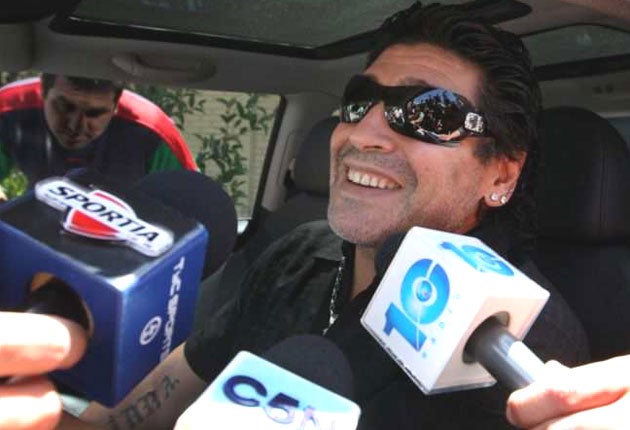Maradona returns from the abyss to coach Argentina
World Cup-winning player is a national hero – with an underwhelming coaching CV

Tony Adams's appointment as manager of Portsmouth on Tuesday prompted several questions about whether, after a brief spell managing Wycombe, a period coaching in the Netherlands, and two years assisting Harry Redknapp at Fratton Park, he had enough experience.
The following day Argentina confirmed they are about to appoint Maradona as national coach. Maradona has had two coaching jobs, two months at little known Deportivo Mandiyu in 1994 and four months at Racing Club the following year. He won three matches out of 23. Since then he has undergone treatment for drug addiction, obesity and alcohol-induced liver disease, become best mates with Fidel Castro, and been self-appointed cheerleader to the albiceleste. Not quite the CV of the coach to international football's other great under-achievers, Fabio Capello.
The appointment looks about as logical as the Football Association calling for Paul Gascoigne. However, this is not quite the knee-jerk reaction it appears. Maradona is going to get significant back- up. Carlos Bilardo, who coached Argentina's Maradona-inspired 1986 World Cup winners, will have a technical director-type role while former team-mate Pedro Troglio, currently managing in Paraguay, and fellow 1986 winners Jose Luis Brown, also Argentina's under-17 coach, and Hector Enrique could also be involved. The equivalent, then, is Gascoigne as the figurehead supported by Terry Venables, Paul Ince, Stuart Pearce and Chris Waddle.
Maradona was involved, in a peripheral role, with the Bejing Olympic success and there is no questioning his status among the highly talented crop of current players even if the fact that his daughter is about to provide Maradona with a grandchild fathered by Atletico Madrid's Sergio Aguero could provide a conflict of interest. He is also regarded as a deity by much of the Argentinian population, which should at least ensure the demanding sports media tread carefully.
Nevertheless the vastly experienced Carlos Bianchi, Miguel Angel Russo of league leaders San Lorenzo, or the Olympic winning coach Sergio Batista would seem more obvious choices.
Batista is expected to take charge of Argentina when they come to Scotland next month for a friendly with Maradona and his support team taking over before the next World Cup qualifying tie at home to Venezuela in March. Argentina are third in the 10-team South American group. The top four qualify. Argentina have won one of their last eight qualifiers, drawing six, but losing their last match to Chile, the first defeat by their neighbours in 35 years.
They do, though, have the players, especially in attack. Maradona insisted that "I am the one who will chose the team," which, if recent statements are anything to go by, could mean a recall for Juan Sebastian Veron, probably at the expense of Juan Roman Riquelme.
The appointment of Maradona, who is 48 today, is expected to be confirmed at the AFA's next executive meeting on Tuesday. He said: "My first job will be watching the players. I'll try to talk to them one by one and then work at the training camp with them."
Maradona competed at four World Cups. In 1982 he was sent off as Argentina lost to Brazil; in 1986 he carried the team to victory; in 1990 he was a shaft of light in a cynical team which reached the final; and in 1994 he was banned after failing a drug test.
At club level, after starting at the age of 15 with Argentinos Juniors, he joined Boca Juniors, winning the title before transferring to Barcelona. Injuries and an unprofessional lifestyle marred his stay, but when he moved to unfashionable Napoli he inspired the club to the only Serie A titles in their history.
After being banned for testing positive for cocaine, becoming mixed up with the Camorra (the Neapolitan mafia), and fathering an illegitimate child he moved to Seville, then back to Argentina, finishing his career at his beloved Boca Juniors.
None of his various scrapes have damaged his standing with the Argentinian public; his supporters hope his reputation also survives managing the national team.
Subscribe to Independent Premium to bookmark this article
Want to bookmark your favourite articles and stories to read or reference later? Start your Independent Premium subscription today.

Join our commenting forum
Join thought-provoking conversations, follow other Independent readers and see their replies